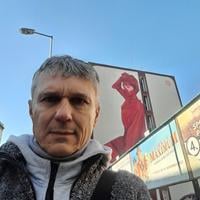I am an Američan. Like many Americans who encounter Slovakia, I have fallen in love. I have been hit by Slávy's thunderbolt and have fallen in love with her daughter. I am only a student of Slovakia, a relatively new one at that, and so I do not know if it is culturally appropriate to wear one’s heart on his sleeve, to speak of his heart as if it is a hart (a deer) panting for the brook. Perhaps you have fallen in love like this too, but was it with a country? Now you can see my dilemma.
Such a malady! Such a mladý!
Yes I am in love—with Slovakia. It sounds a bit silly doesn’t it? It’s true though, and when you are in love you want to write poetry, you want to sing about your love as if you were a tipsy reveler. You forego all propriety and want to shake the hand of every person you meet in the cold of winter as if you welcoming the warm bloom of Spring. It is an intoxicating ambrosia. It is love.
But, for a country?
Yes, you are well within your rights to think I’m crazy. If so, you are in good company. Even in America I get puzzled looks when I talk to my friends about Slovakia in this way. Obviously, I want my friends to share in this bouyance of spirit with me. I want them to tell me what they see when they, too, gaze upon Slávy Dcera! So I ask them to look with me. Which is to say, I ask my friends to tell me what they see when they look at Slovakia and their (crushing) replies follow:
Friend 1: “Slovakia? Is that, like, a new brand of vodka or something? Haven’t tried it.”
Friend 2: “Slovakia? Isn’t that a country near Czechoslovakia? Don’t hold me to it, though.”
Friend 3: “Come to think of it, my great-aunt did marry someone from Slovenia.”
Friend 4: “I think we passed through it on our way to Texas last year.”
Friend 5: “Sorry, I’m not that good at geography. Slovakia, is that a Greek island?”
What!? At first, I was confused. How can Americans have almost no knowledge of Slovakia? Maybe you think I asked the wrong friends, or need new ones, but these are well-educated Americans in several different professions. I might as well be asking them about the lost city of Atlantis. Then the sad truth hits me: Slovakia is lost to most Americans.
This troubles me, and I think I am in good company. It was troubling to Ján Kollár too. Kollár, the great, Slovak literary giant of the nineteenth century was also in love with Slávy Dcera. Kollár shares his fear that, in his day, he asked, would the Slavic people and culture disappear entierly from Europe? In Pŕedzpév, the forward to his great work, Slávy Dcera, Kollár shares his love and this fear. I am sure that Kollár wrote poetry, the universal language of love, to express his deep affection for Mína, Slávy Dcera. Thankfully, his fears were not realized. Kollár would be pleased to see that Slovak (and Slavic) culture not only survived but is thriving in Europe, and his Mína, (the subject of Slávy Dcera and the personification of all that is beautiful in slavic culture), still captures the heart of anyone who would but look.
The problem with Americans, speaking as an American, is that we have lost out ability to look.
That said, let me turn the tables. In future blogs I will explain how I travel to Slovakia each week and visit a new town. For now it is enough to say that I do travel to a new town each week. I come to these towns as a man in love. And as I travel I meet and get to know many people throughout Slovakia, the question I bring with me is, what does Slávy Dcera think of me? How do people in Slovakia see Americans? Once again, all I had to do was ask. I asked the people I meet in Slovakia to share with me what they think about Americans? I urged each one to be honest and their (crushing) replies follow:
Friend 1: “In American, you go to work, go home to dinner, get a beer and watch sport all night.”
Friend 2: “I think everyone is rich in America. That cannot be true, but that’s what I think.”
Friend 3: “Everyone goes to Starbuck’s. I wish we had Starbuck’s.”
Friend 4: “In American, democracy works. Here, it’s a different story.”
Friend 5: “Jobs in America are as easy to get as picking apples from a tree. Not here.”
What?! As an American, I try to assure my Slovak friends this is not the America I know. I try to explain this but to little avail. In fact, I speak more enthusiastically about my love of Slovakia and here, too, I get puzzled looks. My Slovak friends point out to me the stark, socialist architecture; they remind me of the unemployment rate, the fight against corruption, and other social struggles. Maybe Kollár is more contemporary than I had first thought. An acquaintance of mine, a professor in Bratislava, explained Kollár’s Slávy Dcera, the ideal of Mína, in this way: “do not call the place you live your holy homeland, the right homeland is in your heart, and from that place nobody can steal it from you, or conquer it, beat it out of you, or defeat it.”
Ah, now this is poetry!
Perhaps I am in love with Slovakia, with Slávy Dcera, precisely because my heart needs to hear these words and I see it everywhere in the collective spirit of Slovakia. Do you still see it too? You know, we do not have ethnic culture in America. While we are an extraordinary melting pot of cultures, the price we pay in America is that we do not have one ourselves. How can a heart not feel the weight of such loneliness? So I am led to believe that each of us, the American and the Slovak, need Slávy Dcera more than ever, for the sake of both of our cultures. To Ján Kollár, Mína remains the mirror of all that is beautiful in Slavic culture to Slovak people. To my heart at least, Mína is Slovakia, and the mirror of all (almost all) that is beautiful in life. May we each, Slovak and American, never tire of seeking Slávy Dcera.
---
Jeffery Sparks | Kansas (USA)
(And thank you Daniel Hevier for your Inspiration)!






